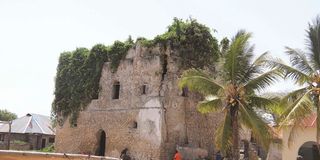Inside Kenya’s ‘last town’ with no bank, church, bar or guest house

An old building that was used as an administrative office in the pre-colonial era in Vanga town, near the border of Kenya and Tanzania.
It's a sunny Tuesday, at 9.30am, and Feruz Mohammed has just picked up a visitor from the bus stop in Vanga, about 17 kilometres from Lunga Lunga on the Kenya-Tanzania border.
The visitor is new in town. And she might just spend a night or two.
Feruz walks her along a fairly narrow street made of Cabro blocks. There is not much activity on the streets. A one-storey building stands out as one enters the town. It belongs to the Member of County Assembly for Vanga ward.
“Umetuletea mgeni?” (You’ve brought us a visitor?) asks an old man on the veranda of the old rusty iron sheet shops.
"Our town is small. Everyone knows everyone else. It's no surprise that they already know you are a visitor," Feruz, who was born and bred in the area, says.
Kenya's last town
Vanga is a small town with a population of about 10,000. It is located at the farthest end of Southeast Kenya. It is known as Kenya's last town because the only place to go past there is Tanzania, or the Indian Ocean.
Vanga residents, except for a few businesspeople, are Muslim. This has made the small town in a fishing port stick to its tradition amidst a modern world. There is no church, bar, guest house or lodging in the town.
There are no supermarkets, shopping malls, or taxis as seen in most Kenyan towns.
A source said that most of the fishermen have not embraced the culture of saving, hence the absence of banks. They get their food from the sea and are not worried about tomorrow.
'Brother's keeper'
Even without lights on the seven streets of the town, the security of the area is remarkably tight; everyone is their 'brother's keeper'. Feruz further explains that there were only five known thieves in the town, who, because of drug abuse, got into crime.
"Our people are deeply rooted in religion and culture. It is believed that lodgings promote promiscuity. That is why there isn't one. The majority are also Muslim, and that explains the absence of a church here," he says.
Vanga is a strategic town, other than being Kenya's last village, it is also a fishing port, where fishermen dock dozens of their boats.
Historical significance
The town is of rich historical significance; it played host to monuments and historical buildings used in World War II.
In the evening, things are much slower in Vanga. A walk along the narrow streets reveals women seated out on verandas. Some are selling Swahili snacks while others are packing the sardines that had been drying up during the day into baskets.
But the evening is also the most dreaded time for any visitor.
First, the last of the countable 14-seater public vehicles out of the town leaves by 6.30pm. This means if a visitor wants to leave the town after that, they may have to take a motorbike to Lunga Lunga town, 20km away, or start thinking of finding a place to sleep.
There is only one place to sleep, and it's not available to everyone.
One family decided to use the extra room in their house to host only specific visitors that are either in the town to research environmental issues, or a guest that is well known by a resident of the town.





